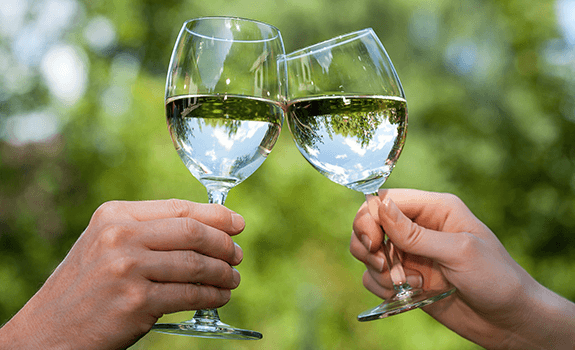News•December 14, 2023
Salud

By Valerie Driscoll, Lead Coach and Coaching Program Developer for Apollo Health
Salute, Salud, Skal, Saúde. Around the world, glasses clink together, and toasts are made to one another’s health. But as the toasting season approaches, I am inviting you to think about your relationship to the contents of your glass and how it truly relates to your health.
The Brain Food Pyramid Level 5: Indulgences include alcohol, for which the protocol has very specific recommendations: a little, both in quantity and frequency and make it dry red wine. This “what to do” is pretty simple in theory, but my clients often struggle mightily with the dreaded “how to do.” Alcohol should be among the least complicated of the indulgence foods to manage, as it is usually consumed alone rather than an ingredient. To not indulge in alcohol, one does not have to ask for a recipe; one simply says “no.”
It is that devil of a brain, however — the very organ that we are trying to heal — that gets in the way of our best intentions of saying no. You see, among its other functions, the brain uses story-making to help us simplify complex information. It is the brain’s shorthand of sorts: input A automatically translates to output B. By engaging in this process, the brain conserves the energy required to sort through tons of information continuously.
Stories about alcohol come up frequently in my coaching: spouses not able to drink alone, happy hours that truly cannot be happy without a beer, and a glass of wine officially ending of the workday, with each story feeling absolutely true to the storyteller.
It is here that mindfulness again proves itself a superpower of habit change. A reminder that, in its simplest form, mindfulness is about honing the skills of awareness and attention. Through the practice, we get better at noticing where our automatic stories hijack our best intentions and how to direct our attention to a different story that is better aligned with our values. The practice also requires doing this with curiosity, kindness, and a sense of data collection. When we pay attention with curiosity, teasing apart old stories even becomes an interesting game.
The idea for this piece came during my yearly trip to New Orleans. NOLA holds wonderful memories, many of which involve bourbon and ice. Never in a big way, but in a cozy, welcome home I am on vacation with best friends, and this is the “only place I drink bourbon kinda way.” I have written about this before because NOLA always pushes up against my protocol practice with brut force, but with every NOLA trip, it gets a little bit easier to say no to temptation. This year, although I was on the precipice of bourbon a few times, bourbon never happened. My mindfulness practice allowed me to get in the middle of my bourbon story and make consistently better choices. It also helped with my beignet, po’boy, fried oyster, and generally fried everything stories, and then helped me create a brand new story involving New Orleans and designer shoes; it was a total win-win.
If you have a bourbon/wine/egg nog/ champagne story of your own, here are some steps to try:
Remember that you are committing to a practice. When you do not get your desired outcome, go back with curiosity and self-compassion and try to learn from your experience.
Slow down and observe your current stories — notice what showed up automatically — don’t try to change the story; just watch it unfold. What is your mind trying to convince you to believe? What emotions are mingled in with the story? Where do they show up in your body? Notice it all. Now, get curious as to the difference between truth and the noise.
For me, New Orleans and bourbon it goes a little like this:
Someone asks me if I want a drink. Autopilot fires “yes,” and a little hit of happiness pings in my body. My story rapid-fire rotation: “This is a ritual of my visit, and a little bourbon will be fine. I deserve it, especially now that beignets are a thing of the past; bourbon is cool, and I am cool when I drink bourbon.”
I let myself feel it all and just observe. Then, I examine the truth: none of this relates to bourbon. The happiness comes from the ritual, great memories, and good friends, and this is where I have practiced putting my attention. The experience of being with them is the same, even with water in my rocks glass. My attention also goes to what I know to be true: there is no place where bourbon is going to improve my life, so is it worth it?
As with any of this work, strive for compassion rather than perfection and make the process interesting. Through examining my automatic stories, I have discovered so much about what really holds value in my life, and it has been a true gift, one that I hope you can also give to yourself this season.
For the holidays, why not try a delicious Kojito from Apollo Health’s KetoFLEX 12/3 recipe collections available to PreCODE and ReCODE members?




